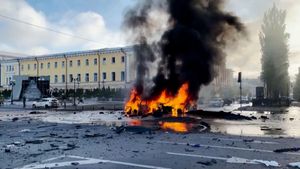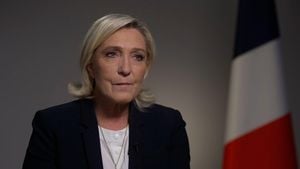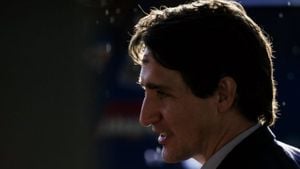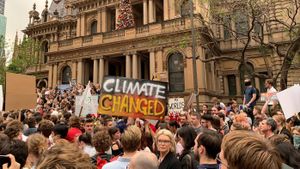Berlin, Germany – Upcoming elections are often tumultuous affairs, but the political climate brewing in Germany is particularly charged as the country gears up for what is shaping up to be one of its most significant elections. With just three months left before the polling day, the stage is set for debates and discussions centered on the past three years of governing under the coalition known as the "traffic light" – which unites the Social Democratic Party (SPD), the Greens, and the Free Democratic Party (FDP).
The German political milieu was recently jolted with the announcement of snap elections, likely taking place on February 23. This decision followed the abrupt dissolution of the ruling coalition on November 6 after Chancellor Olaf Scholz dismissed his finance minister, FDP leader Christian Lindner. Scholz's confidence vote, scheduled for December 16, sets the clock ticking as parties scramble for positioning and strategy.
But what really led to this turbulent fall from grace? The traffic light coalition was already on shaky ground, with tensions simmering beneath the surface. The roots of discord can be traced back to their differing ideologies, particularly around fiscal policy. Critics had long sensed friction between the FDP’s fiscal conservatism and the SPD and Green’s ambitions for increased social and climate spending. Things reached a boiling point over the preparations for the 2025 budget, with Scholz advocating for the suspension of Germany’s strict “debt brake” policy, which limits borrowing, much to Lindner’s chagrin.
“It was difficult to reconcile those three very different political ideas and ideologies,” remarks Markus Ziener, a senior fellow at the German Marshall Fund think tank, pointing to how this internal strife has compromised Germany's leadership role within the European Union during a time of maximum need.
It’s not just political chaos; the electoral atmosphere is influenced by various external factors. The looming return of Donald Trump to the political stage, alongside rising tensions from the conflict between Russia and Ukraine, adds layers of complexity. Germany plays a substantial role as the second-largest supporter of Ukraine, often caught between its military commitments and economic impacts of the war.
Currently, the redrawing of political alliances and standing party loyalties is causing quite the stir. A recent poll indicates the Christian Democratic Union (CDU), led by Friedrich Merz, is standing tall, boasting around 32 percent support. Merz has stirred the political pot, with intentions to return the country to familiar norms—a potential coalition with the SPD or Greens seems possible, as the latter parties are currently polling around 16 and 12 percent respectively.
Merz, whose leadership style has gradually shifted the CDU to the right since he took over, has promised to dismantle several of the current coalition's initiatives focused on environmental policy, center stage of the coalition's platform since 2021. His recent statements reflect stark conservative values: “It is time for a fundamental course correction in migration, security, foreign and economic policy,” showing not just intentions for governance reform but also rallying pragmatic support from his base. Scholz, often depicted as the weakest link among chancellors throughout the post-war era, announced intentions to run again as the SPD’s candidate. Yet, most of his party's heavyweights are ready to make quick moves away from his tenure.
Drawing attention from the traditional parties is none other than the far-right Alternative for Germany (AfD), reporting soaring support at around 20 percent. This rise, especially amid allegations of extremist ties within its leadership, has alarmed opponents, many of whom refuse to entertain any coalition with the AfD, yet its growing presence is certain to wield more influence across key parliamentary committees.
Meanwhile, the less traditional leftist formations are also stepping onto the political stage. The newly formed Sahra Wagenknecht Alliance is garnering approximately 7 percent support, whereas both the FDP and the socialist Left party are struggling to hurdle the 5 percent threshold required for parliamentary entry.
Key themes defining the election's discourse span beyond internal structures; they encompass pressing foreign policy and economic stability missions. The repercussions of Trump’s statements on NATO funding and military support to Ukraine stick like ink to Germany’s future funding negotiations amid the conflict. Scholz has maintained diplomatic channels with Russian President Vladimir Putin, cautious not to provoke escalation but also balancing international pressures. On the contrary, Merz presents a hawkish front, advocating for stronger military cooperation on weapons deliveries, mirroring stances held by prominent allies like the UK and the US.
Despite the apparent turmoil, there’s pressure from financial institutions and business stakeholders urging comprehensive reforms to Germany’s debt policies. Merz has recently hinted at being open to discussions around this typically conservative stance on finance. The structure, entailed under Germany’s debt brake, limits borrowing, yet off-the-books mechanisms have emerged as slightly compromising this norm, igniting debates among policymakers about potentially significant alterations to these rules.
Leading economic analysts, including Max Krahe, director at Dezernat Zukunft, have posited the need for upwards of $782 billion in public spending before 2030 to address widespread concerns ranging from defense to healthcare without reaching for constitutional amendments. “The bigger question is whether there's political consensus to utilize debt as leverage to solve our issues,” Krahe stated, urging for immediate forward thinking.
With the realities of economic strain weighing on voters’ minds, the forthcoming months will be pivotal for political candidates to articulate clear responses to public concerns about the economy. Current evaluations from Germany’s central bank depict the country narrowly avoiding recession yet trapped within stagnation, vulnerable to global trade shifts. An anticipated squeeze as Tariff implementations under Trump loom overhead complicate the economic horizon even more.
Germany stands at yet another crossroads as election fervor heats up, with traditional parties wrestling for their footing and new alliances seeking to carve out space among disenchanted voters. The upcoming electoral battle promises to redefine the political discourse, presenting not just shifts within the country’s political fabric but also substantial ramifications for Europe moving forward. The outcome could set the stage for whether Germany maintains its stability domestically and its leadership internationally—or whether it tumbles yet again amid conflicting ideologies and political power struggles.



